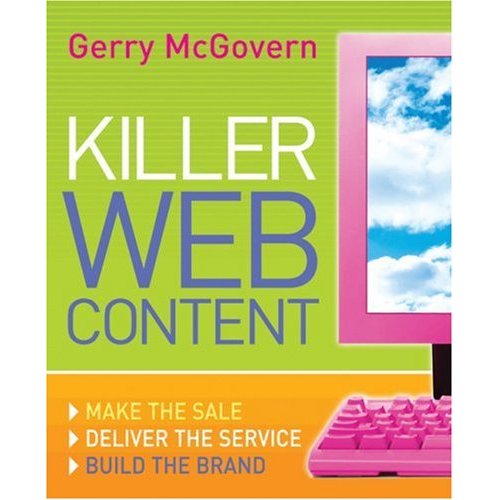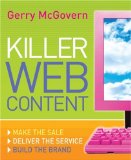 Killer Web Content by Gerry McGovern, 2006.
Killer Web Content by Gerry McGovern, 2006.
Amazon says:
Killer Web Content provides the strategies and practical techniques you need to get the very best out of your web content. The book helps readers to: provide visitors to their website with the right content at the right time, write compelling web content that users respond to and…read the rest here
Review
The most overused, undervalued statement I hear in the content niche is: “You must have great content.”
Sure — that’s obvious — but why be so casual about it? Shouldn’t nearly all of our energies be applied toward creating the highest quality content possible?
Killer Web Content reassures us that someone out there is passionate enough to write a solid book about the vitality, priority and importance of content on the web. To sum it up — this book really works. It’s filled with practical, easy-to-understand advice on how to make your content do exactly what it’s intended for: to “make the sale, deliver the service and build the brand.”
Author Gerry McGovern gives great insight and ground truth to the process of creating, managing and testing content. He says the biggest content mistake in content writing is when we put the needs or whims of our organization (us) before the needs of our customers (or readers). He calls this “writing for the ego” — something we’re conditioned to do but desperately need to break out of.
The secret to writing killer content, therefore, is make your reader king and not your content (he says: “your reader needs to stand beside you as you write”). So, as writers, we need to constantly ask ourselves: who are we writing for, what are their needs, and what do they care about?
The book follows a logical thought sequence from beginning to end. “Part I: The Theory” covers the mindset we need to have on the web: less is more and the customer rules. The web is a competitive, self-service environment that requires us to be direct, relevant and precise every time.
“Part II: The Practice” covers useful techniques that really can help us make our content stand out from the crowd. This section is the biggest one on the book and also the most helpful. McGovern covers a lot of ground here, from the “Six Cs” (excellent advice) to keywords (he calls them carewords) to how to write winning headlines, summaries and meta tags. I’ve actually used this section of the book for a lot of my client work.
“Part III: The Boring (But Important) Stuff” is about how to research, be organized and collaborate with others to create awesome content. There is also “A Final Word” at the very end that neatly sums up the book and explains why our words can carry great power on the web.
What I Love About “Killer Web Content”
By far the best part of Killer Web Content is McGovern telling us we need to be great editors, not just writers. [Secret: this one detail sums up Wordful’s entire blogging philosophy.] A great editor is someone who has a deep understanding of what their readers care about and want to read about. They also control the quality of a website.
 Also, Killer Web Content is a smooth and easy read. The page design and layout are easy on the eyes, with many engaging colors, photos and illustrations. I can tell McGovern has put great effort into simplifying the very complex and cerebral subject of web content. The guy is rather witty, too — a smug master of the written word.
Also, Killer Web Content is a smooth and easy read. The page design and layout are easy on the eyes, with many engaging colors, photos and illustrations. I can tell McGovern has put great effort into simplifying the very complex and cerebral subject of web content. The guy is rather witty, too — a smug master of the written word.
What I really enjoyed were the standalone phrases he tactfully sprinkles throughout the text. Little nuggets like:
“The most valuable knowledge is the most difficult to automate or outsource.”
“Geniuses steal. Beggars borrow.”
“Trust is hard won and easily lost.”
“If in doubt, cut it out.”
My personal favorite: “You can’t have great content if you don’t have great thinking.”
Blogging Not Really a Focus
This book does not focus strongly on content in the context of blogging. There is a chapter on it called “To blog or not to blog?,” which gives an elementary overview of blogging — what it is, what it’s for, etc. — but nothing of significant value.
The light touch is for good reason, though. McGovern by trade focuses more on the larger, more traditional types of websites — the ones run by large companies, governments and universities, as well as intranets (*yawn*).
To give justice to us bloggers would require McGovern to be one himself, which he admittedly isn’t (although he offers a weekly email newsletter which I’ve gotten for couple of years now).
Who This Book Is For
Anyone who brainstorms, develops, writes, produces, manages, edits or has anything at all to do with the content on a website. This means you, blogger!
Rated: 4.5 out of 5. I docked half a star for the weaker section on blogging. But don’t let that stop you — Killer Web Content is an absolute must-have on all blogger’s bookshelf. Amazon is currently offering the book for $16.47, which is 34% off the cover price — it’s worth every penny. Buy it now here.


A friend of mine just emailed me one of your articles from a while back. I read that one a few more. Really enjoy your blog. Thanks
I have difficulties with the thought that someone can value or judge what is good and bad content on PERSONAL BLOGS.
I don’t blog to have other people read what I write. I blog for personal enjoyment, so anything I post on MY Blog I obviously feel is “Good Content”.
Whether someone else feels the same way about it or not… is really none of my business. If someone doesn’t want to read my blog because of my poor content… then so be it.
Energy spent on creating high quality content… is energy taken away from providing MORE Information.
There is the argument… “What is better? More Information… Or Less Quality Information?”
I’ve always felt that More information is better, because it can appeal to a larger audience. Just because something might not appeal to someone reading one post… doesn’t mean that the next post you write later in the day won’t appeal to that same person.
Yes, Damon, you have a valid point when you distinguish personal from non-personal blogs — there are vast differences. Good content on personal blogs need not matter as much as professional ones.
Many niches blogs will require good content if they expect to build readership and establish authority. Take a look at copyblogger.com, zenhabits.net and problogger.net.
Quality vs. quantity — one usually gets sacrificed for the other. I prefer to side with quality and usefulness, but that is because I have a certain audience in mind with a certain set of expectations.
Your blog works very well for a more general audience — which is fine. You can do very well as blogging personality, which in itself is a great position to be in. I definitely admire your prolificacy and ubiquity!